Hey, if you’re tired of slugs and snails munching on your plants, let’s tackle this naturally. Start with simple barriers and repellents that really work, like copper tape around pots or beds, creating a tiny electric shock. These pests hate crossing it, trust me. I’ve got more tricks up my sleeve, from gritty eggshells to a surprising brew, so stick around for the full scoop.
Contents
Copper Barriers Deter Slugs
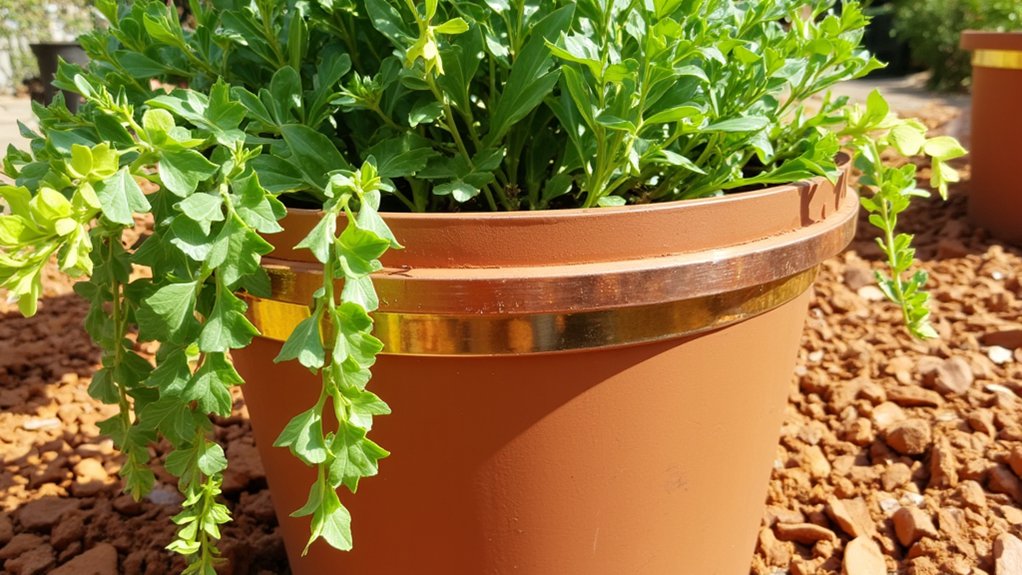
While you might not think of copper as a garden tool, it’s actually a fantastic way to keep slugs at bay. See, slugs get a tiny electric shock when they touch copper, so they avoid it.
You can use this to your advantage by setting up barriers. Grab some copper tape, about 2 inches wide, and wrap it around plant pots or garden bed edges. Make sure it’s snug, with no gaps, or those sneaky slugs will slip through.
Check the tape every few weeks for dirt or debris, and clean it with a cloth if needed. Replace it every 6-12 months, as weather can wear it down. With this simple trick, you’re protecting your plants naturally and effectively.
Diatomaceous Earth Repels Slugs
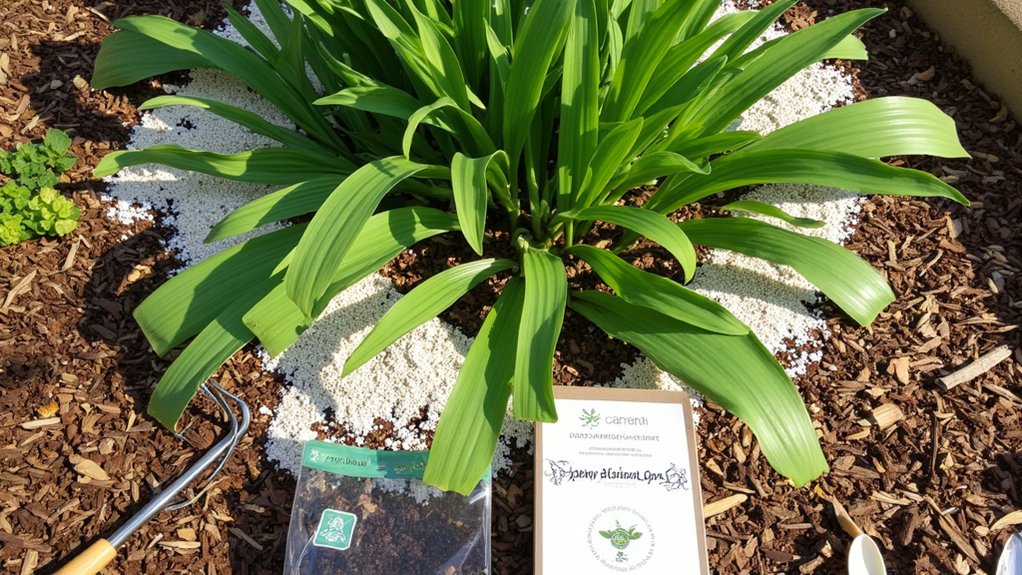
Hey, let’s talk about another awesome way to keep slugs off your plants: diatomaceous earth. This powdery stuff, made from fossilized algae, is a natural slug repellent. It’s sharp on a microscopic level, so it cuts into slugs’ soft bodies, drying them out.
Here’s how you use it. Grab food-grade diatomaceous earth, and sprinkle a thin layer, about 1-2 inches wide, around the base of your plants. Do this when it’s dry outside, since rain washes it away. Reapply every few days or after rain, ensuring consistent protection.
Make sure you’re wearing a mask while applying it, as the dust can irritate your lungs. Keep it away from pets too. This simple trick works wonders in your garden!
Eggshells Deter Slugs Naturally
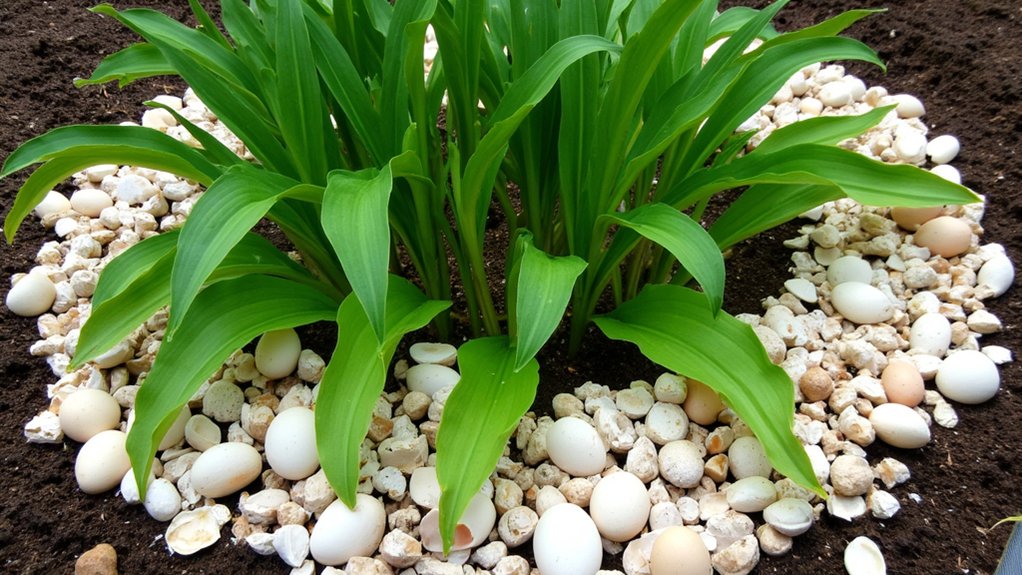
Let’s switch gears and chat about using eggshells to keep slugs at bay. You’ve got a simple, natural trick right in your kitchen. Crush up those leftover eggshells, and don’t toss them out just yet.
Spread the crushed shells around your plants, creating a barrier about 2-3 inches wide. Slugs hate the sharp, jagged edges; they won’t cross this prickly defense. Make sure you sprinkle a fresh layer every week, especially after rain, as shells can break down. Collect shells daily if you cook often, aiming for a small handful per plant.
This method’s cheap and easy, reusing waste you’d otherwise discard. Check your garden every few days, ensuring the barrier stays intact for best results.
Coffee Grounds Repel Slugs
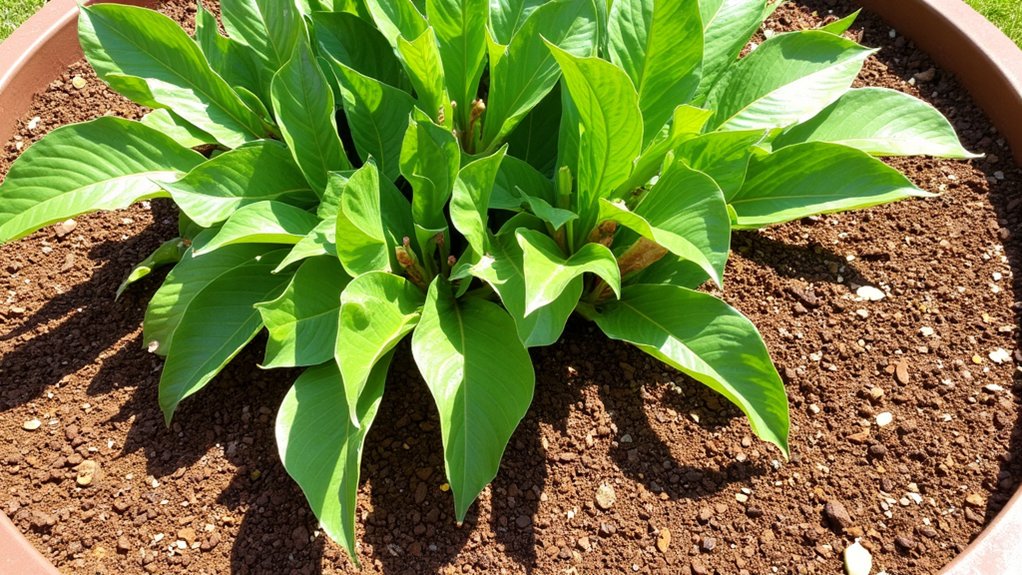
Another handy trick to fend off slugs is using coffee grounds, a resource you might already have. Don’t toss those used grounds after your morning brew; they’re useful! Spread a thin layer, about half an inch thick, around the base of your plants.
This works because slugs dislike the gritty texture and caffeine content. Sprinkle roughly two tablespoons per small plant, or more for larger ones, every week. Make sure you cover the soil evenly, especially near the stems, to create a barrier.
If it rains, reapply the grounds, as they can wash away. Check every few days to see if slugs are still sneaking in. Adjust the amount if needed, but don’t overdo it—too much can affect soil acidity.
Garlic Spray Repels Slugs
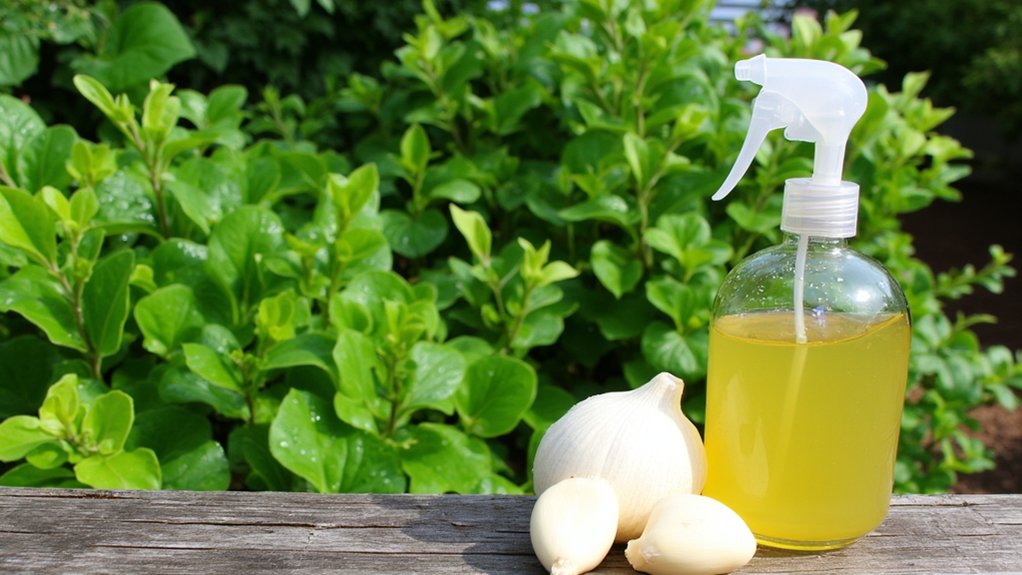
Count on garlic, a kitchen staple, to help you battle those pesky slugs. It’s a simple, natural repellent they hate. Crush two large garlic bulbs, then mix them with a gallon of water. Let this concoction sit for 24 hours to infuse properly.
Now, strain the liquid into a spray bottle for easy use. Spray it directly on your plants’ leaves, especially around the base, every few days. Make sure you cover areas where slugs creep in at night. Reapply after rain, as it can wash away.
This garlic spray won’t harm your plants, and it’s cheap to make. Keep it handy for regular use. You’ll notice fewer slugs munching on your garden in no time.
Seaweed Mulch Deters Slugs
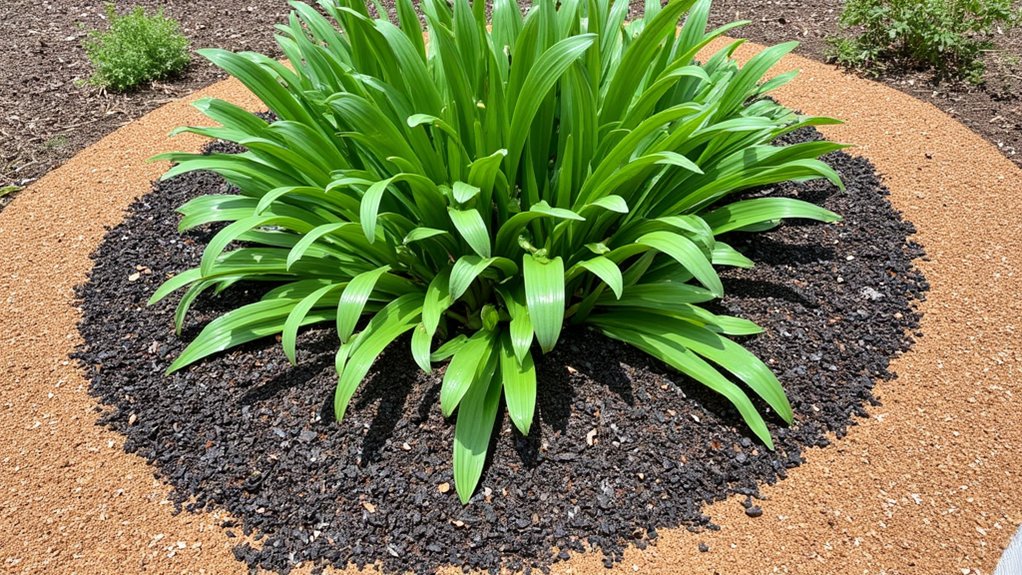
Try using seaweed mulch as a clever way to keep slugs at bay. You’ll find it’s a natural, effective barrier they hate crossing. Seaweed’s salty texture and sharp edges irritate slugs, so they steer clear of your plants.
Here’s how to apply it: collect or buy dried seaweed, then spread a 2-inch layer around your garden beds, especially near vulnerable plants like lettuce or hostas. Make sure it’s about 3-4 inches wide around each plant base for full coverage. Replenish it every 2-3 weeks, as rain can wash away the saltiness.
You can often get seaweed from local beaches if you’re nearby, or purchase it at garden centers. It’s a simple trick that also enriches your soil over time!
Wool Pellets Deter Slugs
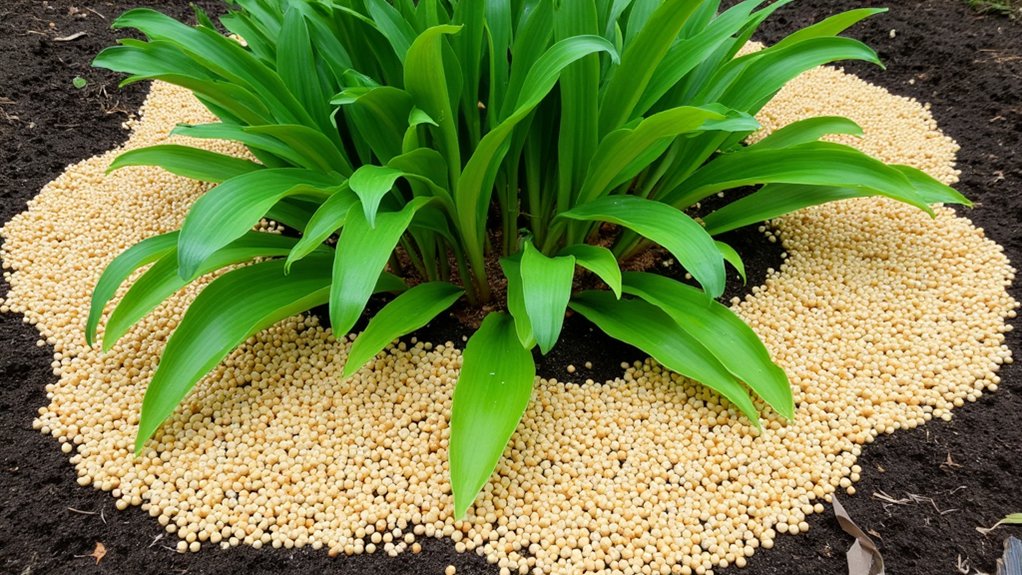
Wool pellets offer a unique way to keep slugs off your plants. You’ve probably never thought of wool as a garden tool, but it works surprisingly well. These small, compacted pellets, often made from sheep wool, create a rough barrier that slugs hate to cross.
Here’s how you use them: spread a 1-inch thick layer of wool pellets around the base of your plants, covering about a 6-inch radius. Make sure it’s even, as gaps can let slugs sneak through. The texture irritates their slimy bodies, so they’ll steer clear. Reapply every 4-6 weeks, especially after heavy rain, since the pellets can break down. It’s a simple, natural fix that’s worth trying in your garden.
Beer Traps Attract Slugs
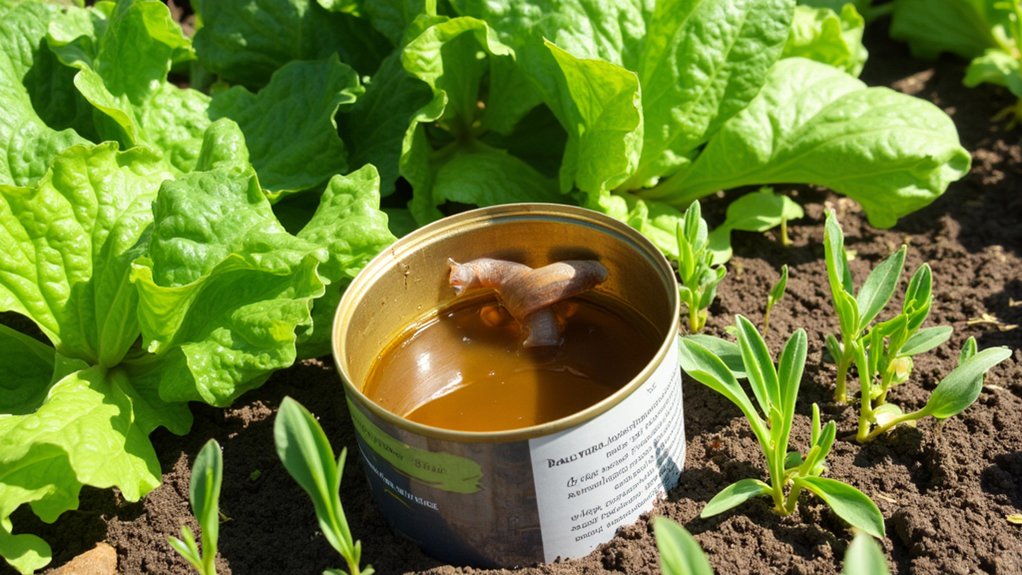
Several gardeners swear by beer traps as a clever way to lure slugs away from plants. You’ve probably got some old beer lying around, right? Grab a shallow container, like a tuna can or small bowl, and let’s get started.
Here’s how you do it: bury the container in your garden so the rim sits at soil level. Pour in about 2-3 inches of beer—any cheap kind works fine. Slugs can’t resist the yeasty smell, so they’ll crawl in overnight and get trapped. Check the trap each morning, empty it out, and refill as needed.
Keep placing these traps every 3-5 feet near vulnerable plants. You’ll notice fewer slugs munching your greens in just a few days. Simple, effective, and oddly satisfying!
Citrus Peels Repel Slugs
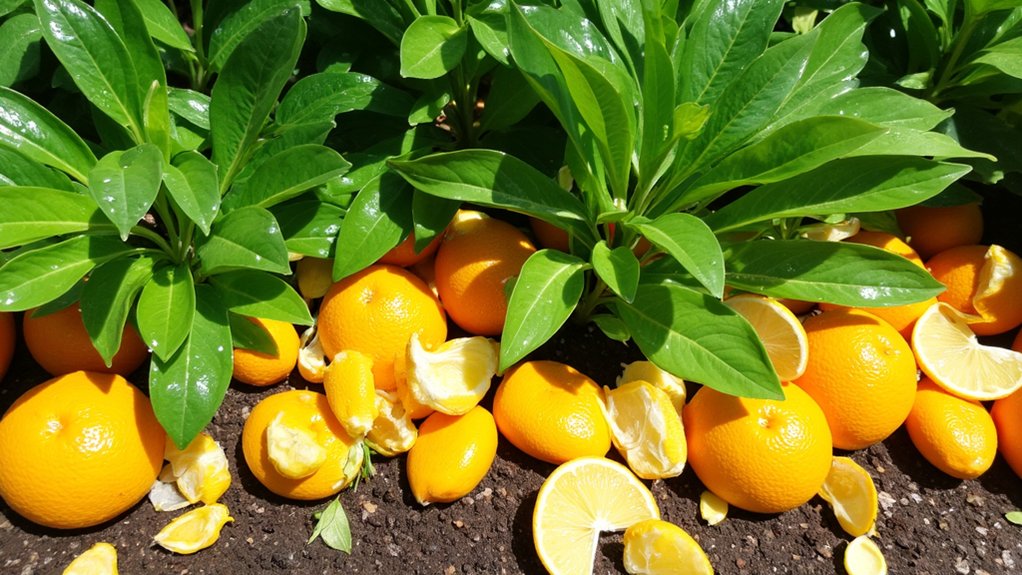
Got some leftover citrus peels from your morning orange or last night’s lemon? Don’t toss them out just yet, buddy. You’ve got a natural slug repellent right there in your hands.
Citrus peels, like orange or lemon rinds, give off a sharp scent that slugs can’t stand. Take those peels and cut them into small, 1- to 2-inch pieces. Then, scatter them around the base of your plants, especially in damp, shady spots where slugs hide.
Make sure you replace the peels every 2-3 days, as they’ll lose their potency when they dry out or decompose. Check early mornings for fewer slugs creeping around. It’s a simple trick, and you’re recycling kitchen scraps while protecting your garden!
Pine Needle Mulch
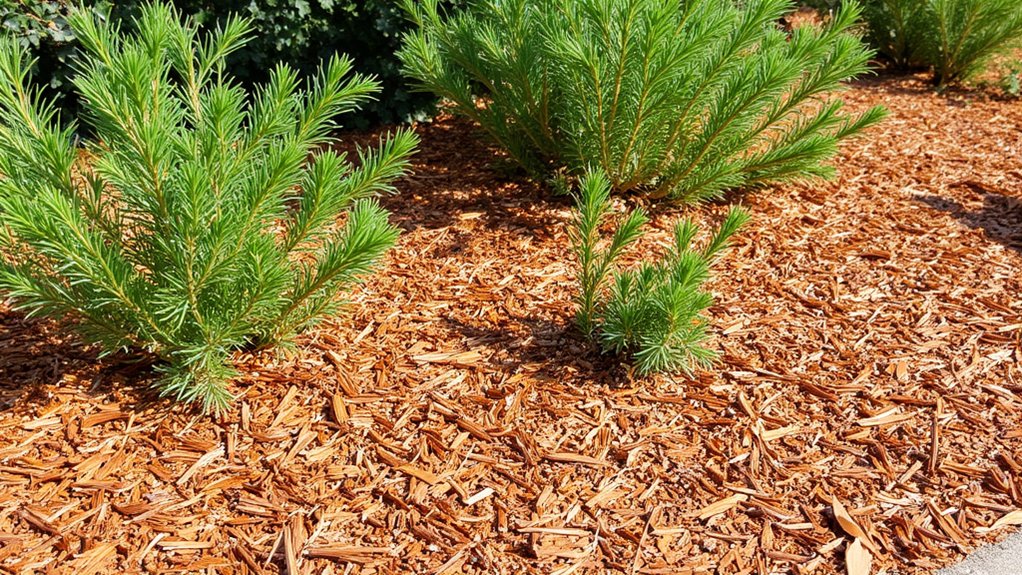
Hey there, let’s talk about using pine needle mulch to keep slugs and snails at bay. You’ve probably got pine trees nearby, right? Their needles make a fantastic, natural barrier that these slimy pests hate.
Spread a 2- to 3-inch layer of pine needles around your plants, especially near the base. Make sure you cover the soil evenly, as gaps can let slugs sneak through. The sharp, dry texture irritates their soft bodies, so they’ll avoid crossing it.
Collect fresh or dried needles, but check for pests before using them. Reapply every few weeks, since they break down over time. It’s a simple trick, and bonus, it keeps your garden looking tidy while enriching the soil naturally.
